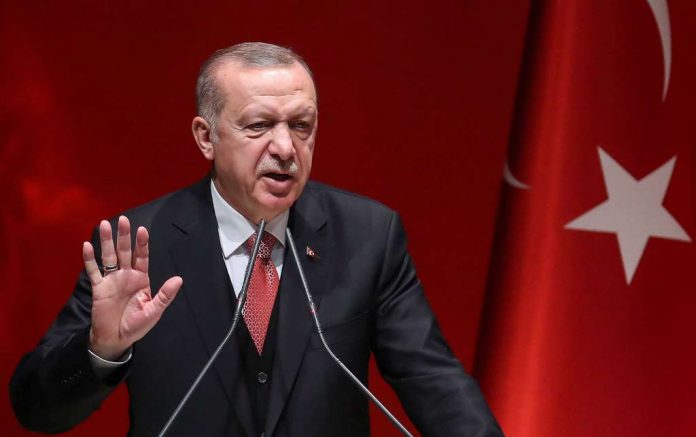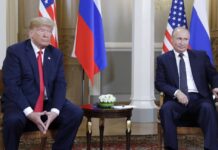On the shore of the Turkish city of Izmir, once known as Smyrna, where more than 150,000 Greek and Armenian inhabitants of the city were slaughtered and more than 750,000 made refugees by Turkish forces during the burning of Smyrna in September 1922, a statue of Turkish General Mustafa Kemal Ataturk on horseback facing and pointing West is inscribed with the quotation “Armies, your first target is the Mediterranean Sea. Forward!”
There is talk in Washington, DC about dealing with the “world as it is,” but in reining in rogue ally, Turkey, the United States and European Union continue to do the bare minimum required to address the greatest threat to peace and stability in Europe, the Eastern Mediterranean, North Africa, Middle East and Central Asia. At the recent Munich Security Conference, US President Joe Biden declared, “America is back, the transatlantic alliance is back,” and affirmed America’s unshakable commitment to the North Atlantic Treaty Organization Alliance and diplomacy.
French President Emmanuel Macron, however, is the only Western leader with the courage to address the clear and present danger Turkish President Recep Tayyip Erdogan’s ambitions pose beyond Turkey’s borders. France has taken a leadership role in Europe as Germany and the United Kingdom continue to avoid exercising sound judgment and taking appropriate action in European security matters. French President Macron is correct in stating Europe must embrace “strategic autonomy” and take greater ownership of its security interests beyond the framework of NATO. Macron understands.
As the 200th anniversary of the fight for freedom from Ottoman rule and the rebirth of democracy in Greece approaches, Erdogan’s authoritarian government continues to engage in direct acts of passive and active aggression against United Nations member-states, EU member-states, NATO allies and partners and US interests.
Erdogan commands the second largest military force in NATO. His military force of 435,000 is one-third the size of the United States’ 1.3 million-strong force and twice the size of the next largest NATO ally, France, with its 208,000-strong force. The Turkish “allied” force, however, continues to demonstrate it is an adversary with access to NATO’s secrets, codes, communications, tactics and defense plans.
Erdogan is emboldened by the enduring myth of Turkey’s geostrategic importance, greatly diminished since the end of the Cold War, and the decades-long failure of the EU, US and NATO to properly address Turkish aggression. Turkey’s decades-long unreliability as an ally, its role as a gateway for foreign jihadi fighters between Europe, the Middle East and North Africa, and flirtation with China and Russia in advanced weapons procurements – most recently, the Russian S-400 missiles – affirm Turkey cannot be trusted as a NATO ally.
A significant enough concern for the US State Department and Department of Defense to remove dependents of US diplomats and military personnel assigned to posts in Turkey in 2015.
Failure to rein in Erdogan has destroyed the credibility of NATO, the EU and US. As a member of the NATO Alliance, the US, and other NATO nations, should be outraged by Erdogan’s continued assaults on the EU’s borders in Greece and the Aegean, the Turkish military occupation of a EU sovereign state, Cyprus, claims to EU Economic Zone hydrocarbon resources in the Eastern Mediterranean, the desecration of UNESCO World Heritage Christian monuments, and recent attempts to derail the unification of Cyprus.
Erdogan’s hostile acts embody and represent the types of threats the Alliance and United States are committed to deterring and defeating.
From the desecration of Christian United Nations Educational, Scientific and Cultural Organization (UNESCO) World Heritage sites in the conversion of Hagia Sofia and the 1,000-year-old Byzantine Church of the Holy Savior in Chora into mosques, support for the human trafficking of migrants into Europe, violent attacks and oppression of Kurds in Turkey and Syria, to diplomatic security force attacks on US citizens in Washington, DC, support for Islamic terrorists and militias in Syria, northern Iraq and Libya, the issuing of Turkish passports and sanctuary to Hamas officials, violations of EU air space and territorial waters, illegal exploration for oil and gas in the exclusive economic zones (EEZ) of Greece, Cyprus and Israel, illegal claims of sovereignty in the Eastern Mediterranean, the purchase of advanced S-400 Russian weapons systems, the imprisonment of political opponents and journalists, the enduring illegal military occupation of the northern part of EU member Cyprus, and support for Azerbaijan’s genocidal attack on Armenian Christians in Nagorno-Karabakh, Erdogan’s nationalist “Neo-Ottoman” ambitions are the greatest threat to Western civilization, peace and stability since the rise of communism and the expansionist aims of the Soviet Empire during the Cold War.
Despite the US Congress and Senate’s passing of the Eastern Mediterranean Security and Energy Partnership Act of 2019, and US-imposed sanctions under the Countering America’s Adversaries Through Sanctions Act (CAATSA) in December of 2020 for Turkey’s July 2019 acquisition of an S-400 surface-to-air defense system from Russia, Erdogan remains defiant.
He condemned the sanctions as a “blatant attack” on Turkish sovereign efforts to establish an independent defense industry. And political parties representing a large majority of Turkey’s Parliament have issued a joint declaration opposing the US decision. Turkey’s Foreign Ministry has stated Turkey “will retaliate in a manner and timing it deems appropriate.” Erdogan has threatened to close Turkish bases to US military personnel and assets.
Erdogan’s latest moves declaring support for a two-state solution in Cyprus and stating that if Greece declares its borders in the Aegean, per the UN Convention on the Law of the Sea (UNCLOS), it would be considered a casus belli, “act of war,” and affirm Erdogan is committed to continuing his aggression. His rhetoric and actions demand an immediate, clear and concise response.
It is time to show Turkey that the US, NATO, EU and our partners are committed to dealing with “the world as it is” and rein in Erdogan and his destabilizing acts that threaten peace and stability from Europe to the Balkans, to North Africa, the Eastern Mediterranean, Middle East, and Central Asia.
Turkey’s rogue behavior must be addressed decisively and immediately with actions, not just words. More robust sanctions are needed combined with coordinated US, EU and partner nation “Freedom of Navigation” air and maritime operations to remind Turkey, as we remind adversaries, where Turkey’s sovereignty ends and responsibility to defend international rule of law as a nation-state and NATO ally begins.
* Commander Demetries Grimes is a former US naval officer, aviator and diplomat. He has served as naval attaché to Greece and Israel, deputy commander of the US base in Crete, and adviser to NATO’s Maritime Commander in London, UK.
kathimerini














